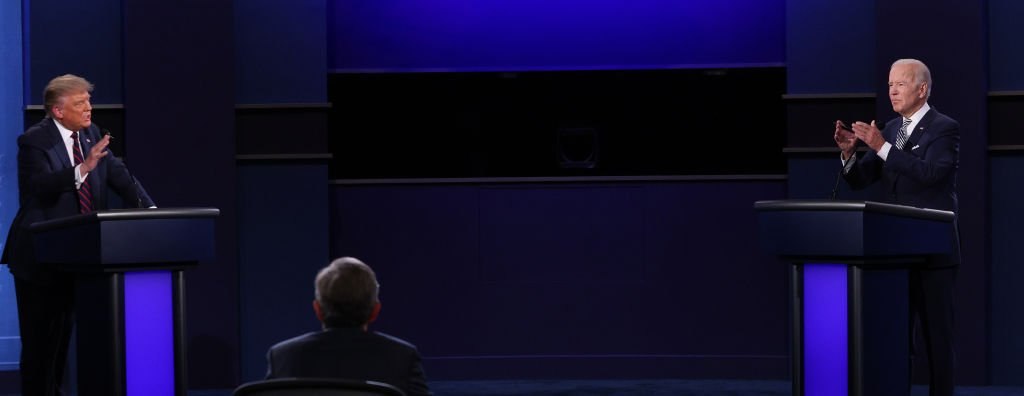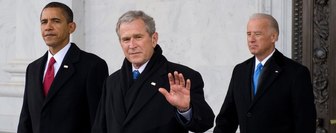On the eve of the final 2020 presidential debate between Democratic presidential nominee Joe Biden and President Donald Trump, many Americans in the latest Economist/YouGov Poll aren’t sure a debate is needed at all (43%). That’s particularly true of those voters who expect to vote for Biden (61%). While the President’s supporters want more debates, one in four of them would be happy if there were no more.
Thursday’s debate is one of the last opportunities for the President to reach out to voters – though only 4% of likely voters still declare themselves undecided. It may be more important for the President to make sure that those voters who support him turn out to vote.
His supporters are more likely to be watching the debate. Nearly half of those voting for President Trump say they will definitely be watching on Thursday night, compared to only a third of Biden’s voters.
Polls conducted after the first debate found voters saying that Biden won. That is the expectation this time, too. Among all likely voters, 45% believe Biden will do the better job in Thursday’s debate; 36% think the President will. However, among those who will definitely be watching, more of whom favor the President than support Biden, the President is seen as the likely debate victor, 48% to 40%.
Campaign time is running out as large numbers of Americans have already cast or mailed their ballot. Among those who say they have already voted Biden has a massive lead. Those votes are banked and cannot be affected by anything that happens in the next two weeks; for those voters the final debate does not matter. The President must get his supporters – nearly half of whom say they will vote in person on Election Day – to do exactly that.
Mail voting concerns Trump voters, while COVID-19 at polling places worries Biden voters
Trump supporters disapprove of mail voting. Voters overall approve of mail voting by nearly two to one (63% to 33%), but the President’s voters disapprove by an even greater margin (30% to 66%). However, those Trump supporters who have voted or plan to vote by mail this year approve of it, by 67% to 27%.
In general, voters are content with the process of voting. Most who have voted say the process was easy or convenient. Seven in ten of those who voted in person say they spent less than a half-hour in line, but 12% say it took an hour or more. As for those who will vote in person on election day, nearly two-thirds say they will be willing to stand in line “as long as it takes.”
The possibility of violence or intimidation at polling places worries Biden voters more than it does Trump supporters (39% vs 21%) as does the availability of polling locations (41% vs 13%). Nevertheless, most people in both voting groups express little to no concern about these issues.
What does concern the large majority of Biden voters, however, is the possible spread of COVID-19 at polling places. Three quarters of those planning to vote for the Democratic candidate say they are “very” or “somewhat” concerned about this, although just 22% of Trump voters say the same.
Trump still has an image problem compared to Biden
Joe Biden leads the President by significant margins among likely voters as a candidate who is honest and trustworthy (49% to 37%) and likeable (49% to 31%). When it comes to handling COVID-19, half (49%) say they are confident in the Democrat’s ability to handle the pandemic, compared to 41% who are uneasy about his approach. For the President, 40% are confident, but 56% are uneasy.
There is almost no difference in the perception of the two men on leadership, or on voter expectations for the economy: voters are just as likely to say the economy will improve under each candidate as they are to think it will get worse.
The poll findings on overall candidate images underscore the President’s challenges in the last two weeks of this election. Biden and his running mate, California Senator Kamala Harris, earn net favorable ratings from likely voters, while Trump and his Vice President, Mike Pence, are seen negatively.
Underscoring the ratings of the candidates is the significant gap between views of the Democratic Party and the Republican Party among likely voters. While voters are as likely to have an unfavorable as a favorable opinion of the Democratic Party, their opinion of the GOP is clearly negative, by a 19-point margin.
See the toplines and crosstabs from this week’s Economist/YouGov Poll
Methodology: The Economist survey was conducted by YouGov using a nationally representative sample of 1,500 registered voters interviewed online between October 18 - 20, 2020. This sample was weighted according to gender, age, race, and education based on the American Community Survey, conducted by the US Bureau of the Census, as well as 2016 Presidential vote, registration status, geographic region, and news interest. Respondents were selected from YouGov’s opt-in panel to be representative of all US citizens. The margin of error is approximately 2.9% for the overall sample.
Image: Getty








